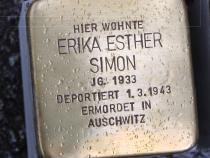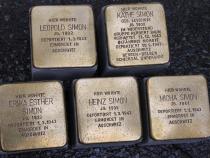Location
Badstraße 44
District
Gesundbrunnen
Stone was laid
07 March 2018
Born
10 May 1933 in
Deportation
on 01 March 1943
to
Auschwitz
Murdered
March 1943 in Auschwitz
Erika Esther Simon was born on 10 May 1933 in Berlin. She was raised in a traditional Jewish household; her parents Käthe and Leopold Simon ran a successful jeweller’s and gold items shop on Bülow Straße in Schöneberg. When she was one year old, her parents moved to Grunewald Straße 63 where they lived in an apartment behind their shop. It is unlikely that Erika was aware of the move, but she probably consciously experienced the birth of her brother Heinz when she was two-and-a-half. We know very little more about her early childhood, but it was certainly affected by the intensifying persecution suffered by the Jewish population in Germany.
When Erika was five, her parents’ shop was looted and demolished during the night of pogroms in November 1938. Her aunt later testified: “In the Night of Broken Glass, several people broke into the shop from the street. My sister and her family immediately fled the apartment though the window overlooking the courtyard to my parents’ home. The clockmaker’s shop and the adjacent apartment were completely destroyed, and all the valuables looted.” The children must have noticed their parents’ panic as they fled their home with their two small children. The violent mob on the street, the looting and arson in the night of 9 November 1938 must have made a deep impression on Erika. She and her family went to stay with her grandparents on Bad Straße in Wedding. She never saw her old home again.
Erika’s grandfather Michaelis Leschnik was a successful clockmaker and jeweller, whose shop in Wedding was also wrecked during the pogroms. Out of despair at the loss of his life’s work and fear of what was to come, he took his own life in spring 1939 in the nearby River Panke. This, too, must have made a deep and terrible impression on Erika, who was then almost six. Shortly afterwards her grandmother Johanna Leschnik was forced to move away to the far west of the city, into a so-called “Jews’ home”. Eventually, Erika and her family were also given orders to move into rooms let by a Jewish butcher on Oranienburger Straße. A friend of her mother described the quarters as “the smokerooms of a slaughterhouse”.
Here, on 11 June 1941, Erika’s little brother Micha was born, named after his grandfather Michaelis Leschnik. But the Nazis’ name-changing law of August 1938 severely restricted the options for Jewish parents naming their children and Erika’s parents were not allowed to call the baby Micha. They were forced to choose from a list of supposedly Jewish names, designed to make children easily identifiable as Jewish, and opted for ‘Mechel’ as this was closest to the name Micha. On the memorial stone that Erika’s aunt Irene Zimmt had erected after the war for Michaelis Lechnik and his family on the Jewish Cemetery, the name ‘Micha’ appears, not ‘Mechel’.
The older Erika became, the worse the situation around her was. In January 1942, her great aunt committed suicide to escape deportation. Then in June 1942 her grandmother was deported to Sobibor. Erika must have sensed her parents’ concern at not hearing any word of her grandmother after that. But the event which must have upset her most was the arrest of her mother Käthe, who was remanded in custody in Moabit in December 1942 because she had organized a place to stay for a resistance fighter of the Herbert Baum group who had gone underground.
At the same time, her father Leopold was made to perform forced labour. During the day, being the eldest, ten-year-old Erika probably had to take care of her younger siblings alone. But worse was still to come. On 27 February 1943, during the Nazis’ “factory campaign”, Leopold Simon was arrested at his workplace and taken to an assembly camp. Erika and her brothers were left on their own without any news from their father for several days, as they were not collected from the apartment until shortly before their deportation. They and their father were deported to Auschwitz on 1 March 1943. But that is not to say they were together as they travelled to their deaths: Leopold was entered as number 336 on the transport list while the children had the numbers 1839-1841. Erika and her brothers, and her father too, were murdered immediately on arrival in Auschwitz.
Erika’s mother Käthe was deported from prison to Auschwitz. Her sister recognized her on a photo of the liberation of Bergen-Belsen concentration camp but that was the last that was seen or heard of her.
When Erika was five, her parents’ shop was looted and demolished during the night of pogroms in November 1938. Her aunt later testified: “In the Night of Broken Glass, several people broke into the shop from the street. My sister and her family immediately fled the apartment though the window overlooking the courtyard to my parents’ home. The clockmaker’s shop and the adjacent apartment were completely destroyed, and all the valuables looted.” The children must have noticed their parents’ panic as they fled their home with their two small children. The violent mob on the street, the looting and arson in the night of 9 November 1938 must have made a deep impression on Erika. She and her family went to stay with her grandparents on Bad Straße in Wedding. She never saw her old home again.
Erika’s grandfather Michaelis Leschnik was a successful clockmaker and jeweller, whose shop in Wedding was also wrecked during the pogroms. Out of despair at the loss of his life’s work and fear of what was to come, he took his own life in spring 1939 in the nearby River Panke. This, too, must have made a deep and terrible impression on Erika, who was then almost six. Shortly afterwards her grandmother Johanna Leschnik was forced to move away to the far west of the city, into a so-called “Jews’ home”. Eventually, Erika and her family were also given orders to move into rooms let by a Jewish butcher on Oranienburger Straße. A friend of her mother described the quarters as “the smokerooms of a slaughterhouse”.
Here, on 11 June 1941, Erika’s little brother Micha was born, named after his grandfather Michaelis Leschnik. But the Nazis’ name-changing law of August 1938 severely restricted the options for Jewish parents naming their children and Erika’s parents were not allowed to call the baby Micha. They were forced to choose from a list of supposedly Jewish names, designed to make children easily identifiable as Jewish, and opted for ‘Mechel’ as this was closest to the name Micha. On the memorial stone that Erika’s aunt Irene Zimmt had erected after the war for Michaelis Lechnik and his family on the Jewish Cemetery, the name ‘Micha’ appears, not ‘Mechel’.
The older Erika became, the worse the situation around her was. In January 1942, her great aunt committed suicide to escape deportation. Then in June 1942 her grandmother was deported to Sobibor. Erika must have sensed her parents’ concern at not hearing any word of her grandmother after that. But the event which must have upset her most was the arrest of her mother Käthe, who was remanded in custody in Moabit in December 1942 because she had organized a place to stay for a resistance fighter of the Herbert Baum group who had gone underground.
At the same time, her father Leopold was made to perform forced labour. During the day, being the eldest, ten-year-old Erika probably had to take care of her younger siblings alone. But worse was still to come. On 27 February 1943, during the Nazis’ “factory campaign”, Leopold Simon was arrested at his workplace and taken to an assembly camp. Erika and her brothers were left on their own without any news from their father for several days, as they were not collected from the apartment until shortly before their deportation. They and their father were deported to Auschwitz on 1 March 1943. But that is not to say they were together as they travelled to their deaths: Leopold was entered as number 336 on the transport list while the children had the numbers 1839-1841. Erika and her brothers, and her father too, were murdered immediately on arrival in Auschwitz.
Erika’s mother Käthe was deported from prison to Auschwitz. Her sister recognized her on a photo of the liberation of Bergen-Belsen concentration camp but that was the last that was seen or heard of her.




